Sunday, April 30, 2006
Paraguay
...why (again)
Another backwater of South America and another place I know I must come back to.
 In fact, I just took a swift visit to Asunción, the capital, which I had been told was a bit boring...and in truth if you arrive on a Sunday, like we did, it's pretty dead, and once you've seen the sites, there isn't a whole lot more to do in the traditional tourist sense of the word. So we jumped on buses and headed to different parts of the city and out of town, along highways with buses spewing out exhaust and getting jammed up in the traffic. In all the big cities I visited so far street sellers jump on the busses hawking all sorts of stuff, but here it's utterly mekty... at one point there was a procession out numbering the passengers selling (all for around a 1000 gurarni each - about 10p) the following:
In fact, I just took a swift visit to Asunción, the capital, which I had been told was a bit boring...and in truth if you arrive on a Sunday, like we did, it's pretty dead, and once you've seen the sites, there isn't a whole lot more to do in the traditional tourist sense of the word. So we jumped on buses and headed to different parts of the city and out of town, along highways with buses spewing out exhaust and getting jammed up in the traffic. In all the big cities I visited so far street sellers jump on the busses hawking all sorts of stuff, but here it's utterly mekty... at one point there was a procession out numbering the passengers selling (all for around a 1000 gurarni each - about 10p) the following:
...and then it was time to get my bus across the border to Argentina, but now I'm just trying to work out just when I will get back there...
Inter-country context:
Cost of using the public lavatory in a bus station:
Another backwater of South America and another place I know I must come back to.
 In fact, I just took a swift visit to Asunción, the capital, which I had been told was a bit boring...and in truth if you arrive on a Sunday, like we did, it's pretty dead, and once you've seen the sites, there isn't a whole lot more to do in the traditional tourist sense of the word. So we jumped on buses and headed to different parts of the city and out of town, along highways with buses spewing out exhaust and getting jammed up in the traffic. In all the big cities I visited so far street sellers jump on the busses hawking all sorts of stuff, but here it's utterly mekty... at one point there was a procession out numbering the passengers selling (all for around a 1000 gurarni each - about 10p) the following:
In fact, I just took a swift visit to Asunción, the capital, which I had been told was a bit boring...and in truth if you arrive on a Sunday, like we did, it's pretty dead, and once you've seen the sites, there isn't a whole lot more to do in the traditional tourist sense of the word. So we jumped on buses and headed to different parts of the city and out of town, along highways with buses spewing out exhaust and getting jammed up in the traffic. In all the big cities I visited so far street sellers jump on the busses hawking all sorts of stuff, but here it's utterly mekty... at one point there was a procession out numbering the passengers selling (all for around a 1000 gurarni each - about 10p) the following:- 1 x icecream (strawberry) - rather melty
- 2 x apples
- 1 x bunch of bananas
- 1 x cup of coke (not the glass bottle because they´re returnable)
- 1 x sprite or coke (plastic bottle) for G$2000
- 300 x cotton buds
- 1 x pack of thread and needles
- 2 x pairs of socks for G$2000
- 1 x handbook on writing and letter on computer for G$5000
- 1 x icecream (chocolate) - very melty
- 1 x bath towel for G$5000
- more apples and bananas
- and I dare say a few other things I've forgotten
...and then it was time to get my bus across the border to Argentina, but now I'm just trying to work out just when I will get back there...
Inter-country context:
Cost of using the public lavatory in a bus station:
- Chile (Púcon): Ch$150 - 16p
- Argentina (Cordoba): Ar$1 - 18p
- Argentina (Buenas Aries): Tip only
- Uruguay (Montevideo): Tip only
- Paraguay (Asunción): G$1000 - 9p
- Paraguay (anywhere else): what toilet? just do it behind the nearest wall
Uruguay
...why?
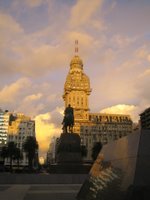 Uruguay is a bit of a backwater as far as South America is concerned, as, on the surface it´s fairly dull: uniformly flat - the largest "mountain" is only 423 ms high, that´s about 3.5 times the height of Highgate Hill - and the majority of the country has been cleared for pasture or farm land, punctuated by the odd cluster of palms or small plantation of firs.
Uruguay is a bit of a backwater as far as South America is concerned, as, on the surface it´s fairly dull: uniformly flat - the largest "mountain" is only 423 ms high, that´s about 3.5 times the height of Highgate Hill - and the majority of the country has been cleared for pasture or farm land, punctuated by the odd cluster of palms or small plantation of firs.
From a touristic point of view the only places thought to be worth visiting are along the Rio Plata or the Atlantic coast, and you have to wonder what lurks in the interior: there´s a town called Trienta y Tres (33) simply because it´s on the 33rd parallel, even the most dull towns usually warrant a saint's name rather than just a grid reference.
However, there´s so much more.
Colonia
 A short ferry ride from Buenos Aires, Colonia is Uruguay´s touristic highlight, a, for the most part, intact colonial fortress town, interlaced with over-photograhed cobbled streets and ancient houses...so I took a picture of the sewage works, which is probably less frequently shown than most sights. On the last night the heavens opened spectacularly, so I headed to the capital the next morning. (Montevideo is the third capital I have visited in a row where I have had to glue my glasses back together).
A short ferry ride from Buenos Aires, Colonia is Uruguay´s touristic highlight, a, for the most part, intact colonial fortress town, interlaced with over-photograhed cobbled streets and ancient houses...so I took a picture of the sewage works, which is probably less frequently shown than most sights. On the last night the heavens opened spectacularly, so I headed to the capital the next morning. (Montevideo is the third capital I have visited in a row where I have had to glue my glasses back together).
Montevideo - Good Friday, Bad Weather
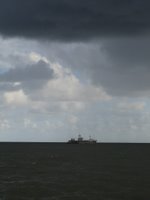 Since I saw The Battle of The River Plate I have had some romantic notion of visiting the city and sitting purched on crates watching for a ship to make a break for the open sea, just like the reporter in the movie... Although I had to make do with standing on end of the harbour wall amongst a gang of crab fishermen on a cloudy day it was a great feeling being in the city.
Since I saw The Battle of The River Plate I have had some romantic notion of visiting the city and sitting purched on crates watching for a ship to make a break for the open sea, just like the reporter in the movie... Although I had to make do with standing on end of the harbour wall amongst a gang of crab fishermen on a cloudy day it was a great feeling being in the city.
While the guide books mention that there's little of the colonial architecture left to see, they fail to mention that you can see in the architecture times of growth and prosperity, like layers of overground archaeology. Hidden amoungst the highrise blocks of the 70´s are spectacular examples of turn of the century, between the wars and post-war buildings. Why some bright spark hasn´t come up with running architectural tours to Montevideo is beyond me.
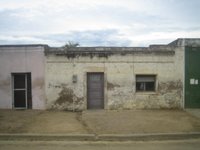 ...or for that matter throughout the country. The coast is dotted with small towns where no two buildings seem to be the same, despite the standard single story box like construction. In Argentina and Chile you so often see out of town developements of row upon row of identical houses, but for whatever reason not here.
...or for that matter throughout the country. The coast is dotted with small towns where no two buildings seem to be the same, despite the standard single story box like construction. In Argentina and Chile you so often see out of town developements of row upon row of identical houses, but for whatever reason not here.
The Atlantic Coast
 I left Montevideo to escape the rain only to find myself in an utterly dreary Punta Del Este over the Easter Weekend. It was here that I decided that it is almost impossible to eat anything in Uruguay without it being covered in mekty* amounts of cheese, some more cheese, and in case you feel like a bit more, more cheese.
I left Montevideo to escape the rain only to find myself in an utterly dreary Punta Del Este over the Easter Weekend. It was here that I decided that it is almost impossible to eat anything in Uruguay without it being covered in mekty* amounts of cheese, some more cheese, and in case you feel like a bit more, more cheese.
* Mekty is a mispelt and misused Norwegian word I've decided to introduce to the English language to mean overpowering/over-the-top, as in "That shirt is well mekty man". In reality it´s spelt "mektig" and means overwhelmingly sweet. Before travelling to Latin America the only Norwegians I had ever met were A-ha, when I worked at Warners, but since I´ve been here I´ve met 7.
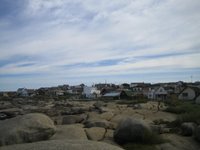 I moved onwards to Punta Del Diablo which is an amazing little town that reminds of a festival site, and where I met two extremely different people. Firstly Nigel, who I would have writen-off as an imbacile if it weren´t for the fact that anyone who gets from Mexico City to Montevideo on a bicycle that looks like it was found in a skip deserves credit of some sort. However I think he must have been kicked in the head by a horse when he was in his early teens as he is the only person I have met who has ever, in all seriousness, said "come the revolution you´ll be the first up against the wall" when relating the tale of one of his run-ins with various authority figures. I did try to suggest that perhaps, however flawed they may be, an attempt a some kind of "truth and reconciliation" program would be better in the event of sweeping social change, rather than wholesale slaughter of the oppressors, but he seemed unconvinced. That and the fact he looked like Rick Parfitt from Status Quo, and wore hot-pants that would make Kylie blush, and you might understand why I was reasonably relieved when he left the day after I arrived.
I moved onwards to Punta Del Diablo which is an amazing little town that reminds of a festival site, and where I met two extremely different people. Firstly Nigel, who I would have writen-off as an imbacile if it weren´t for the fact that anyone who gets from Mexico City to Montevideo on a bicycle that looks like it was found in a skip deserves credit of some sort. However I think he must have been kicked in the head by a horse when he was in his early teens as he is the only person I have met who has ever, in all seriousness, said "come the revolution you´ll be the first up against the wall" when relating the tale of one of his run-ins with various authority figures. I did try to suggest that perhaps, however flawed they may be, an attempt a some kind of "truth and reconciliation" program would be better in the event of sweeping social change, rather than wholesale slaughter of the oppressors, but he seemed unconvinced. That and the fact he looked like Rick Parfitt from Status Quo, and wore hot-pants that would make Kylie blush, and you might understand why I was reasonably relieved when he left the day after I arrived.
The second was Ernesto. If memory serves me well, Hemingway wrote The Old Man and The Sea in Cuba, but you could imagine him sitting in Ernesto's "restaurant" guzzling whatever booze was on hand. Ernesto must think of himself as a bit of a Hemingway character having named his restaurant "El Viejo y La Mar". However I seem to remember Ernest could be an utter w**nker at times, while Ernesto showed nothing but the utterly open and generous character, shared by all the Uruguayans I met, to myself and my travelling budy for that part of my trip, Gromit (who always carried an inexhaustable stash of crackers, hence the nickname).
When the weather turned we made a move back to Montevideo and then onwards to Paraguay. I left knowing that someday I will come back to explore the coast more thoroughly, and perhaps even 33 and the rest of this great little country.
Pythons...
Obviously having been so close to the border, it wouldn't do not to pop over to Brazil ("Hello Mrs Sartre how's your Jean-Paul"... see the Iguazú entry below). We caused utter chaos at the border control, having got ourselves stamped out of the country, Gromit and I went to Choy (Uruguay) to get a bus to Choí (Brazil) only to find out that actually the border is the mainstreet and you don´t need to get stamped out. The imigration man got as close to "slightly vexed" as any Uruguan probably ever does, when two hours and an all-you-can-eat lunch in Brazilian Choí, we presented ourselves back at the border post requesting a new entry stamp. Actually this was all a bit of ruse to sort out our rather messy passports: Gromit needed to swap from Aussie to British to avoid visas for entry into Paraguay and Brazil, and so I took the opportunity to straighted up the stamps that said I´d entered Uruguay a month before the Argentinan stamp said I had left Argentina, and, in reality, the day before I had.
Something to think about if you visit:
Uruguay has a reputation for being cheap but actually compared to Argentina it is expensive, although this is obviously based on tourist prices in tourist areas.
Context:
The minimum wage is 6 Uruguayan Pesos per hour (about 15p), the teacher I met did two jobs and took home about Ur$5,000 per month. In Punta Del Este a Vodka Tonic costs Ur$300, a hostel in Montevideo is Ur$275 per night. Meals on the whole came in around Ur$300 per head, including the cheese.
 Uruguay is a bit of a backwater as far as South America is concerned, as, on the surface it´s fairly dull: uniformly flat - the largest "mountain" is only 423 ms high, that´s about 3.5 times the height of Highgate Hill - and the majority of the country has been cleared for pasture or farm land, punctuated by the odd cluster of palms or small plantation of firs.
Uruguay is a bit of a backwater as far as South America is concerned, as, on the surface it´s fairly dull: uniformly flat - the largest "mountain" is only 423 ms high, that´s about 3.5 times the height of Highgate Hill - and the majority of the country has been cleared for pasture or farm land, punctuated by the odd cluster of palms or small plantation of firs.From a touristic point of view the only places thought to be worth visiting are along the Rio Plata or the Atlantic coast, and you have to wonder what lurks in the interior: there´s a town called Trienta y Tres (33) simply because it´s on the 33rd parallel, even the most dull towns usually warrant a saint's name rather than just a grid reference.
However, there´s so much more.
Colonia
 A short ferry ride from Buenos Aires, Colonia is Uruguay´s touristic highlight, a, for the most part, intact colonial fortress town, interlaced with over-photograhed cobbled streets and ancient houses...so I took a picture of the sewage works, which is probably less frequently shown than most sights. On the last night the heavens opened spectacularly, so I headed to the capital the next morning. (Montevideo is the third capital I have visited in a row where I have had to glue my glasses back together).
A short ferry ride from Buenos Aires, Colonia is Uruguay´s touristic highlight, a, for the most part, intact colonial fortress town, interlaced with over-photograhed cobbled streets and ancient houses...so I took a picture of the sewage works, which is probably less frequently shown than most sights. On the last night the heavens opened spectacularly, so I headed to the capital the next morning. (Montevideo is the third capital I have visited in a row where I have had to glue my glasses back together).Montevideo - Good Friday, Bad Weather
 Since I saw The Battle of The River Plate I have had some romantic notion of visiting the city and sitting purched on crates watching for a ship to make a break for the open sea, just like the reporter in the movie... Although I had to make do with standing on end of the harbour wall amongst a gang of crab fishermen on a cloudy day it was a great feeling being in the city.
Since I saw The Battle of The River Plate I have had some romantic notion of visiting the city and sitting purched on crates watching for a ship to make a break for the open sea, just like the reporter in the movie... Although I had to make do with standing on end of the harbour wall amongst a gang of crab fishermen on a cloudy day it was a great feeling being in the city.While the guide books mention that there's little of the colonial architecture left to see, they fail to mention that you can see in the architecture times of growth and prosperity, like layers of overground archaeology. Hidden amoungst the highrise blocks of the 70´s are spectacular examples of turn of the century, between the wars and post-war buildings. Why some bright spark hasn´t come up with running architectural tours to Montevideo is beyond me.
 ...or for that matter throughout the country. The coast is dotted with small towns where no two buildings seem to be the same, despite the standard single story box like construction. In Argentina and Chile you so often see out of town developements of row upon row of identical houses, but for whatever reason not here.
...or for that matter throughout the country. The coast is dotted with small towns where no two buildings seem to be the same, despite the standard single story box like construction. In Argentina and Chile you so often see out of town developements of row upon row of identical houses, but for whatever reason not here.The Atlantic Coast
 I left Montevideo to escape the rain only to find myself in an utterly dreary Punta Del Este over the Easter Weekend. It was here that I decided that it is almost impossible to eat anything in Uruguay without it being covered in mekty* amounts of cheese, some more cheese, and in case you feel like a bit more, more cheese.
I left Montevideo to escape the rain only to find myself in an utterly dreary Punta Del Este over the Easter Weekend. It was here that I decided that it is almost impossible to eat anything in Uruguay without it being covered in mekty* amounts of cheese, some more cheese, and in case you feel like a bit more, more cheese.* Mekty is a mispelt and misused Norwegian word I've decided to introduce to the English language to mean overpowering/over-the-top, as in "That shirt is well mekty man". In reality it´s spelt "mektig" and means overwhelmingly sweet. Before travelling to Latin America the only Norwegians I had ever met were A-ha, when I worked at Warners, but since I´ve been here I´ve met 7.
 I moved onwards to Punta Del Diablo which is an amazing little town that reminds of a festival site, and where I met two extremely different people. Firstly Nigel, who I would have writen-off as an imbacile if it weren´t for the fact that anyone who gets from Mexico City to Montevideo on a bicycle that looks like it was found in a skip deserves credit of some sort. However I think he must have been kicked in the head by a horse when he was in his early teens as he is the only person I have met who has ever, in all seriousness, said "come the revolution you´ll be the first up against the wall" when relating the tale of one of his run-ins with various authority figures. I did try to suggest that perhaps, however flawed they may be, an attempt a some kind of "truth and reconciliation" program would be better in the event of sweeping social change, rather than wholesale slaughter of the oppressors, but he seemed unconvinced. That and the fact he looked like Rick Parfitt from Status Quo, and wore hot-pants that would make Kylie blush, and you might understand why I was reasonably relieved when he left the day after I arrived.
I moved onwards to Punta Del Diablo which is an amazing little town that reminds of a festival site, and where I met two extremely different people. Firstly Nigel, who I would have writen-off as an imbacile if it weren´t for the fact that anyone who gets from Mexico City to Montevideo on a bicycle that looks like it was found in a skip deserves credit of some sort. However I think he must have been kicked in the head by a horse when he was in his early teens as he is the only person I have met who has ever, in all seriousness, said "come the revolution you´ll be the first up against the wall" when relating the tale of one of his run-ins with various authority figures. I did try to suggest that perhaps, however flawed they may be, an attempt a some kind of "truth and reconciliation" program would be better in the event of sweeping social change, rather than wholesale slaughter of the oppressors, but he seemed unconvinced. That and the fact he looked like Rick Parfitt from Status Quo, and wore hot-pants that would make Kylie blush, and you might understand why I was reasonably relieved when he left the day after I arrived.The second was Ernesto. If memory serves me well, Hemingway wrote The Old Man and The Sea in Cuba, but you could imagine him sitting in Ernesto's "restaurant" guzzling whatever booze was on hand. Ernesto must think of himself as a bit of a Hemingway character having named his restaurant "El Viejo y La Mar". However I seem to remember Ernest could be an utter w**nker at times, while Ernesto showed nothing but the utterly open and generous character, shared by all the Uruguayans I met, to myself and my travelling budy for that part of my trip, Gromit (who always carried an inexhaustable stash of crackers, hence the nickname).
When the weather turned we made a move back to Montevideo and then onwards to Paraguay. I left knowing that someday I will come back to explore the coast more thoroughly, and perhaps even 33 and the rest of this great little country.
Pythons...
Obviously having been so close to the border, it wouldn't do not to pop over to Brazil ("Hello Mrs Sartre how's your Jean-Paul"... see the Iguazú entry below). We caused utter chaos at the border control, having got ourselves stamped out of the country, Gromit and I went to Choy (Uruguay) to get a bus to Choí (Brazil) only to find out that actually the border is the mainstreet and you don´t need to get stamped out. The imigration man got as close to "slightly vexed" as any Uruguan probably ever does, when two hours and an all-you-can-eat lunch in Brazilian Choí, we presented ourselves back at the border post requesting a new entry stamp. Actually this was all a bit of ruse to sort out our rather messy passports: Gromit needed to swap from Aussie to British to avoid visas for entry into Paraguay and Brazil, and so I took the opportunity to straighted up the stamps that said I´d entered Uruguay a month before the Argentinan stamp said I had left Argentina, and, in reality, the day before I had.
Something to think about if you visit:
Uruguay has a reputation for being cheap but actually compared to Argentina it is expensive, although this is obviously based on tourist prices in tourist areas.
Context:
The minimum wage is 6 Uruguayan Pesos per hour (about 15p), the teacher I met did two jobs and took home about Ur$5,000 per month. In Punta Del Este a Vodka Tonic costs Ur$300, a hostel in Montevideo is Ur$275 per night. Meals on the whole came in around Ur$300 per head, including the cheese.
Monday, April 24, 2006
Uruguay and Paraguay
The bits between Argentina and Brazil
Sadly these two countries get mostly ignored by the world and tourists too, in part due to the richness of their neighbours. In fact for the most part all that any one can tell you about Uruguay is that they won the first World Cup, and as for Paraguay is only that it´s somewhere in South America. However, despite the relative poverty of these two countries, they are both rich in and beautiful in their own ways.
Any way, here´s a quick update on me in them, although I shall write more about them, what I´ve been upto and post some images, in a couple of days time.
For the last week or two I have been jumping from place to place, pushed around a bit by the very changable weather in autumnal Uruguay, so I´ve moved further north for a short stay in Asunción, Paraguay´s captial.
Some bits about Uruguay:
A wonderful country and lovely people, but even a the Uruguan girl that worked in tourism I met in Punta Del Este told me there was nothing to see in the middle of the country, so I travelled up and down the Atlantic coast, between Montevideo to Chuy.
A wet Easter weekend in a relatively deserted Punta Del Este made it the fluff dissappointments are made of, but the deserted, blustery but sunny Punta Del Diablo is the stuff of dreams, and one of the most wonderfully chilled places I have been lucky enough to have been in my life. Although finding a dead seal and masses of dead beetles washed up on the otherwise deserted beach wasn´t much fun.
Top tip: If you´re in Punta Del Diablo ever, go to El Viejo y La Mar restaurant, and say hi to Ernesto and Pampita (his dog) from me.
Asunción, Paraguay
I arrived overnight from Montevideo yesterday morning. Sundays in Latin America are a bad time to arrive in any town, they are always very quiet, but as the heat of the day rose it became all but deserted. And whoever said Montevideo was the most laid back capital of South America hadn´t been to Asunción on a Sunday. However this morning things picked up, although it wouldn´t be quite fair to say there was a "rush hour", it was more of a "slightly animated ten minutes". However heading out of the city on the exhaust belching buses this afternoon was anything but sedate. That makes it sound like a terrible place, but ignore that and what other people might say, it´s a really great city, one that I feel safe and comfortable in.
A note on the safety. It is a very safe city. I have however noticed a hierachy in security: If you´re a door man on a cafe-bar you might get a shirt that says "security" on it, if you´re a security guard you have a nightstick, a knife and a pistol, if you´re in the police you have an automatic weapon of some sort and if you´re in the military you get a huge canon type thing... your safety is perhaps assured on the most part there as a tourist or richer citizen, but it unnerved me that the street kids run away when the police cars pass. The poverty is obvious here, there is a shanty town directly opposite the government buildings.
If you come here go to the post office - not an obvious tourist attraction, but go just for a look - it´s very old fashioned in a wonderfully decaying building.
In other news...
Right now I´m just trying to work out if my toes are tanned or if it´s just ground in dirt.
More about all sorts in a couple of days...
Sadly these two countries get mostly ignored by the world and tourists too, in part due to the richness of their neighbours. In fact for the most part all that any one can tell you about Uruguay is that they won the first World Cup, and as for Paraguay is only that it´s somewhere in South America. However, despite the relative poverty of these two countries, they are both rich in and beautiful in their own ways.
Any way, here´s a quick update on me in them, although I shall write more about them, what I´ve been upto and post some images, in a couple of days time.
For the last week or two I have been jumping from place to place, pushed around a bit by the very changable weather in autumnal Uruguay, so I´ve moved further north for a short stay in Asunción, Paraguay´s captial.
Some bits about Uruguay:
A wonderful country and lovely people, but even a the Uruguan girl that worked in tourism I met in Punta Del Este told me there was nothing to see in the middle of the country, so I travelled up and down the Atlantic coast, between Montevideo to Chuy.
A wet Easter weekend in a relatively deserted Punta Del Este made it the fluff dissappointments are made of, but the deserted, blustery but sunny Punta Del Diablo is the stuff of dreams, and one of the most wonderfully chilled places I have been lucky enough to have been in my life. Although finding a dead seal and masses of dead beetles washed up on the otherwise deserted beach wasn´t much fun.
Top tip: If you´re in Punta Del Diablo ever, go to El Viejo y La Mar restaurant, and say hi to Ernesto and Pampita (his dog) from me.
Asunción, Paraguay
I arrived overnight from Montevideo yesterday morning. Sundays in Latin America are a bad time to arrive in any town, they are always very quiet, but as the heat of the day rose it became all but deserted. And whoever said Montevideo was the most laid back capital of South America hadn´t been to Asunción on a Sunday. However this morning things picked up, although it wouldn´t be quite fair to say there was a "rush hour", it was more of a "slightly animated ten minutes". However heading out of the city on the exhaust belching buses this afternoon was anything but sedate. That makes it sound like a terrible place, but ignore that and what other people might say, it´s a really great city, one that I feel safe and comfortable in.
A note on the safety. It is a very safe city. I have however noticed a hierachy in security: If you´re a door man on a cafe-bar you might get a shirt that says "security" on it, if you´re a security guard you have a nightstick, a knife and a pistol, if you´re in the police you have an automatic weapon of some sort and if you´re in the military you get a huge canon type thing... your safety is perhaps assured on the most part there as a tourist or richer citizen, but it unnerved me that the street kids run away when the police cars pass. The poverty is obvious here, there is a shanty town directly opposite the government buildings.
If you come here go to the post office - not an obvious tourist attraction, but go just for a look - it´s very old fashioned in a wonderfully decaying building.
In other news...
Right now I´m just trying to work out if my toes are tanned or if it´s just ground in dirt.
More about all sorts in a couple of days...
Thursday, April 13, 2006
Iguazú or Iguaçu
Indescribable amounts of water however you spell it
I was told the falls at Iguazù are the 12th most amazing thing in the world, with stuff like the Grand Canyon up at the top. I don´t know what the other 10 are but they´re impressive, and I can´t really think how else to put it. The different spellings depend on whether you´re in Argentina or Brazil, either way the falls are amazing... But if you come to the falls I recommend going to the Brazilian side first and then the Argentinian the next day.
 It was a bit of strange feeling knowing that I was just popping over to Brazil after lunch and was back for tea. "Where are you off to dear?, "Oh just popping over to Brazil...", sounds like something out of a Monty Python sketch, "Good luck, dear, and don´t forget to bring back some nuts. We´ve got that nice Mr Sartre coming round for dinner..." - I have no idea if Jean Paul Sartre went to Iguazú but I reckon he´d have been impressed too.
It was a bit of strange feeling knowing that I was just popping over to Brazil after lunch and was back for tea. "Where are you off to dear?, "Oh just popping over to Brazil...", sounds like something out of a Monty Python sketch, "Good luck, dear, and don´t forget to bring back some nuts. We´ve got that nice Mr Sartre coming round for dinner..." - I have no idea if Jean Paul Sartre went to Iguazú but I reckon he´d have been impressed too.
San Ignacio and the route back south
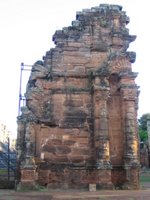 I seem to have swapped visiting a town and seeing a beauty contest for visiting a town and seeing a Jesuit ruin. Sounds dull but the ruins at San Ignacio are breath taking - I actually involuntarily said "wow" when I saw them. You could wander around for ages amoungst them. But don´t do as I did and stay in the town over night... not a lot going on.
I seem to have swapped visiting a town and seeing a beauty contest for visiting a town and seeing a Jesuit ruin. Sounds dull but the ruins at San Ignacio are breath taking - I actually involuntarily said "wow" when I saw them. You could wander around for ages amoungst them. But don´t do as I did and stay in the town over night... not a lot going on.
If you are in the area go to Posadas, a fantastic bustling city with views over the Parana to Paraguay, and an easy base to visit a whole handful of ruined Jesuits. I only wished I´d stayed longer, but I caught another bus down to another fabulous town, Rosario, birth place of Che Guevara (although the don´t make much fuss about it and building is doesn´t even have a plaque or anything like that on it).
 Rosario is a fantastic city, and Lonely Planet actually turned up trumps for a change: The Savoy Hotel, is a vast rambling hotel that must have really been something at its height. Either by luck or judgement a vast amount of original features are still intact, along with furniture gathered over the decades and never updated.
Rosario is a fantastic city, and Lonely Planet actually turned up trumps for a change: The Savoy Hotel, is a vast rambling hotel that must have really been something at its height. Either by luck or judgement a vast amount of original features are still intact, along with furniture gathered over the decades and never updated.
I returned to Buenos Aires to find the gloomy weather I had escaped from by going up north had finally cleared, so I took the boat across the Rio Plata to Uruguay...
I was told the falls at Iguazù are the 12th most amazing thing in the world, with stuff like the Grand Canyon up at the top. I don´t know what the other 10 are but they´re impressive, and I can´t really think how else to put it. The different spellings depend on whether you´re in Argentina or Brazil, either way the falls are amazing... But if you come to the falls I recommend going to the Brazilian side first and then the Argentinian the next day.
 It was a bit of strange feeling knowing that I was just popping over to Brazil after lunch and was back for tea. "Where are you off to dear?, "Oh just popping over to Brazil...", sounds like something out of a Monty Python sketch, "Good luck, dear, and don´t forget to bring back some nuts. We´ve got that nice Mr Sartre coming round for dinner..." - I have no idea if Jean Paul Sartre went to Iguazú but I reckon he´d have been impressed too.
It was a bit of strange feeling knowing that I was just popping over to Brazil after lunch and was back for tea. "Where are you off to dear?, "Oh just popping over to Brazil...", sounds like something out of a Monty Python sketch, "Good luck, dear, and don´t forget to bring back some nuts. We´ve got that nice Mr Sartre coming round for dinner..." - I have no idea if Jean Paul Sartre went to Iguazú but I reckon he´d have been impressed too.San Ignacio and the route back south
 I seem to have swapped visiting a town and seeing a beauty contest for visiting a town and seeing a Jesuit ruin. Sounds dull but the ruins at San Ignacio are breath taking - I actually involuntarily said "wow" when I saw them. You could wander around for ages amoungst them. But don´t do as I did and stay in the town over night... not a lot going on.
I seem to have swapped visiting a town and seeing a beauty contest for visiting a town and seeing a Jesuit ruin. Sounds dull but the ruins at San Ignacio are breath taking - I actually involuntarily said "wow" when I saw them. You could wander around for ages amoungst them. But don´t do as I did and stay in the town over night... not a lot going on.If you are in the area go to Posadas, a fantastic bustling city with views over the Parana to Paraguay, and an easy base to visit a whole handful of ruined Jesuits. I only wished I´d stayed longer, but I caught another bus down to another fabulous town, Rosario, birth place of Che Guevara (although the don´t make much fuss about it and building is doesn´t even have a plaque or anything like that on it).
 Rosario is a fantastic city, and Lonely Planet actually turned up trumps for a change: The Savoy Hotel, is a vast rambling hotel that must have really been something at its height. Either by luck or judgement a vast amount of original features are still intact, along with furniture gathered over the decades and never updated.
Rosario is a fantastic city, and Lonely Planet actually turned up trumps for a change: The Savoy Hotel, is a vast rambling hotel that must have really been something at its height. Either by luck or judgement a vast amount of original features are still intact, along with furniture gathered over the decades and never updated.I returned to Buenos Aires to find the gloomy weather I had escaped from by going up north had finally cleared, so I took the boat across the Rio Plata to Uruguay...
Monday, April 03, 2006
Sunday in Buenos Aires
San Telmo´s Fire
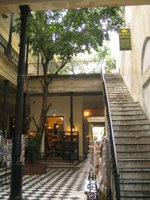 The first proper day of sunshine for some days on Saturday ensured that a good chunk of the tourists crouding into the streets of San Telmo district for the Sunday Antiques Fair were sporting varying shades of red under the little-bit-too-late coats of sun block. Amongst the antiques and bric-a-brac is some truly dreadful art and jewellry that would have Pat Butcher salivating, all with relatively hefty price tags vying to get a share of the tourist dolars - and why not? (See "the most ignorant comment of the day" below). Even the price of empanadas rises on Sundays!!
The first proper day of sunshine for some days on Saturday ensured that a good chunk of the tourists crouding into the streets of San Telmo district for the Sunday Antiques Fair were sporting varying shades of red under the little-bit-too-late coats of sun block. Amongst the antiques and bric-a-brac is some truly dreadful art and jewellry that would have Pat Butcher salivating, all with relatively hefty price tags vying to get a share of the tourist dolars - and why not? (See "the most ignorant comment of the day" below). Even the price of empanadas rises on Sundays!!
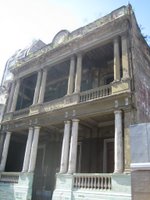 And this is not a market for locals, other than the stall holders and the swarms of tango dancers and musicians. In the restaurants meals are constantly interrupted by less than great singers regurgitating old ballads before passing a hat around. Several try to emulate Carlos Gardell - much loved tango crooner of the porteños - both in style and looks. Although I witnessed one very disgruntled artist wander off after one spectator commented, a little too loudly, "That looks nothing like Bing Crosby!"
And this is not a market for locals, other than the stall holders and the swarms of tango dancers and musicians. In the restaurants meals are constantly interrupted by less than great singers regurgitating old ballads before passing a hat around. Several try to emulate Carlos Gardell - much loved tango crooner of the porteños - both in style and looks. Although I witnessed one very disgruntled artist wander off after one spectator commented, a little too loudly, "That looks nothing like Bing Crosby!"
Most ignorant comment of the day: "Why is it that it seems once they get to a certain age they sell everything they have?" from the fellow that is obviously completely unaware of the 2002 economic meltdown. I came across another reminder down town: a desserted "Harrods" department store with nothing but some very dead palms to be seen through the windows.
The prize for worst tourist hook: Goes to the guy that collects comments from tourists in a notebook, before pitching to sell them tarrot cards. Amongst the "I love BA" messages there was one he couldn't read so he asked me to translate it... I told him that showing a message that read "He's a thieving pikey git" wasn't going to encourage business.
The prize for the strangest thing on sale: Goes to a huge Warhol-esque screen print of Gary "what you talking 'bout Willis" Coleman...why?
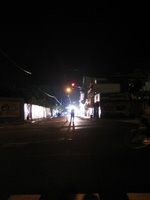 The following weekend saw the commerative parades and marches for the 30th anniversary of the military coup. The city felt very different, (even though the authorities did their best for it not to inconvenience the tourists: you could still take a city tour around the Plaza de Mayo, amongst the bonfires of tires and corn husks). This is the last year that the Mothers of the Plaza de Mayo will hold their weekly silent protests.
The following weekend saw the commerative parades and marches for the 30th anniversary of the military coup. The city felt very different, (even though the authorities did their best for it not to inconvenience the tourists: you could still take a city tour around the Plaza de Mayo, amongst the bonfires of tires and corn husks). This is the last year that the Mothers of the Plaza de Mayo will hold their weekly silent protests.
Chascomus - a town with an instantly forgetable name
..no honestly, I couldn't remember what it was called even when I got there.
 After three weeks in the city, and a not very statisfying spanish course under my belt, I felt the need to get out to the countryside... a pin in the map later and I arrived at the lakeside resort of the Argentinian middle classes, Cahascomus. Pristine parks, clean children, happy dogs and slow moving traffic, it is a living breathing Pleasantville, unrushed in it's out of season traquility - and a great place to lie down and stare at the sky through trees and do absolutely nothing...
After three weeks in the city, and a not very statisfying spanish course under my belt, I felt the need to get out to the countryside... a pin in the map later and I arrived at the lakeside resort of the Argentinian middle classes, Cahascomus. Pristine parks, clean children, happy dogs and slow moving traffic, it is a living breathing Pleasantville, unrushed in it's out of season traquility - and a great place to lie down and stare at the sky through trees and do absolutely nothing...
I stayed in a hillarious hotel run by batty old ladies, who would burp in the corridor, (I'm sure solely for the acoustic effect), and discuss whether they should wake me up for breakfast outside my door before retreating to the front desk to telephone through:
Me: Hello?
Old lady: Are you coming for breakfast?
Me: No, it's really not necessary, thank you.
Old lady: But you ought to have something.
Me: I'm fine, honestly.
Old lady: Not even a little..?
Me: Everything's fine, please, it's really not necessary
Old lady to other old lady: He says he doesn't want anything.
Other old lady: Oh...not even a little? He ought to have something.
Old lady to other old lady: No, he says he's fine.
...this went on for quite a bit.
The old ladies have a little old dog that yaps very excitedly whenever they unfurl a very noisey awning... for the life of me, when I first heard this, I was convinced they were putting the dog, live, through the gigantic bacon slicer they have on the restaurant counter.
I trundled back to BA on the train. The trains have been left behind and almost forgotted because of the numerous road alternatives. Many towns have a station but no service and most no tracks. We passed corals of cattle waiting to go to the slaughter houses, and once thriving towns that were now nothing more than abandoned sidings with dilapedated carriages now used as housing. There were prosperous towns too that benefited from proximity to a road or industry, or like Chascomus survived from increased local tourism since the devalution as many of the upper/middle classes stay at home rather than holidaying in the US and Europe.
Overheard in the street: "What do you mean, you accidentally strapped bricks to your arse and sat on my glasses?"
 The first proper day of sunshine for some days on Saturday ensured that a good chunk of the tourists crouding into the streets of San Telmo district for the Sunday Antiques Fair were sporting varying shades of red under the little-bit-too-late coats of sun block. Amongst the antiques and bric-a-brac is some truly dreadful art and jewellry that would have Pat Butcher salivating, all with relatively hefty price tags vying to get a share of the tourist dolars - and why not? (See "the most ignorant comment of the day" below). Even the price of empanadas rises on Sundays!!
The first proper day of sunshine for some days on Saturday ensured that a good chunk of the tourists crouding into the streets of San Telmo district for the Sunday Antiques Fair were sporting varying shades of red under the little-bit-too-late coats of sun block. Amongst the antiques and bric-a-brac is some truly dreadful art and jewellry that would have Pat Butcher salivating, all with relatively hefty price tags vying to get a share of the tourist dolars - and why not? (See "the most ignorant comment of the day" below). Even the price of empanadas rises on Sundays!! And this is not a market for locals, other than the stall holders and the swarms of tango dancers and musicians. In the restaurants meals are constantly interrupted by less than great singers regurgitating old ballads before passing a hat around. Several try to emulate Carlos Gardell - much loved tango crooner of the porteños - both in style and looks. Although I witnessed one very disgruntled artist wander off after one spectator commented, a little too loudly, "That looks nothing like Bing Crosby!"
And this is not a market for locals, other than the stall holders and the swarms of tango dancers and musicians. In the restaurants meals are constantly interrupted by less than great singers regurgitating old ballads before passing a hat around. Several try to emulate Carlos Gardell - much loved tango crooner of the porteños - both in style and looks. Although I witnessed one very disgruntled artist wander off after one spectator commented, a little too loudly, "That looks nothing like Bing Crosby!"Most ignorant comment of the day: "Why is it that it seems once they get to a certain age they sell everything they have?" from the fellow that is obviously completely unaware of the 2002 economic meltdown. I came across another reminder down town: a desserted "Harrods" department store with nothing but some very dead palms to be seen through the windows.
The prize for worst tourist hook: Goes to the guy that collects comments from tourists in a notebook, before pitching to sell them tarrot cards. Amongst the "I love BA" messages there was one he couldn't read so he asked me to translate it... I told him that showing a message that read "He's a thieving pikey git" wasn't going to encourage business.
The prize for the strangest thing on sale: Goes to a huge Warhol-esque screen print of Gary "what you talking 'bout Willis" Coleman...why?
 The following weekend saw the commerative parades and marches for the 30th anniversary of the military coup. The city felt very different, (even though the authorities did their best for it not to inconvenience the tourists: you could still take a city tour around the Plaza de Mayo, amongst the bonfires of tires and corn husks). This is the last year that the Mothers of the Plaza de Mayo will hold their weekly silent protests.
The following weekend saw the commerative parades and marches for the 30th anniversary of the military coup. The city felt very different, (even though the authorities did their best for it not to inconvenience the tourists: you could still take a city tour around the Plaza de Mayo, amongst the bonfires of tires and corn husks). This is the last year that the Mothers of the Plaza de Mayo will hold their weekly silent protests.Chascomus - a town with an instantly forgetable name
..no honestly, I couldn't remember what it was called even when I got there.
 After three weeks in the city, and a not very statisfying spanish course under my belt, I felt the need to get out to the countryside... a pin in the map later and I arrived at the lakeside resort of the Argentinian middle classes, Cahascomus. Pristine parks, clean children, happy dogs and slow moving traffic, it is a living breathing Pleasantville, unrushed in it's out of season traquility - and a great place to lie down and stare at the sky through trees and do absolutely nothing...
After three weeks in the city, and a not very statisfying spanish course under my belt, I felt the need to get out to the countryside... a pin in the map later and I arrived at the lakeside resort of the Argentinian middle classes, Cahascomus. Pristine parks, clean children, happy dogs and slow moving traffic, it is a living breathing Pleasantville, unrushed in it's out of season traquility - and a great place to lie down and stare at the sky through trees and do absolutely nothing...I stayed in a hillarious hotel run by batty old ladies, who would burp in the corridor, (I'm sure solely for the acoustic effect), and discuss whether they should wake me up for breakfast outside my door before retreating to the front desk to telephone through:
Me: Hello?
Old lady: Are you coming for breakfast?
Me: No, it's really not necessary, thank you.
Old lady: But you ought to have something.
Me: I'm fine, honestly.
Old lady: Not even a little..?
Me: Everything's fine, please, it's really not necessary
Old lady to other old lady: He says he doesn't want anything.
Other old lady: Oh...not even a little? He ought to have something.
Old lady to other old lady: No, he says he's fine.
...this went on for quite a bit.
The old ladies have a little old dog that yaps very excitedly whenever they unfurl a very noisey awning... for the life of me, when I first heard this, I was convinced they were putting the dog, live, through the gigantic bacon slicer they have on the restaurant counter.
I trundled back to BA on the train. The trains have been left behind and almost forgotted because of the numerous road alternatives. Many towns have a station but no service and most no tracks. We passed corals of cattle waiting to go to the slaughter houses, and once thriving towns that were now nothing more than abandoned sidings with dilapedated carriages now used as housing. There were prosperous towns too that benefited from proximity to a road or industry, or like Chascomus survived from increased local tourism since the devalution as many of the upper/middle classes stay at home rather than holidaying in the US and Europe.
Overheard in the street: "What do you mean, you accidentally strapped bricks to your arse and sat on my glasses?"